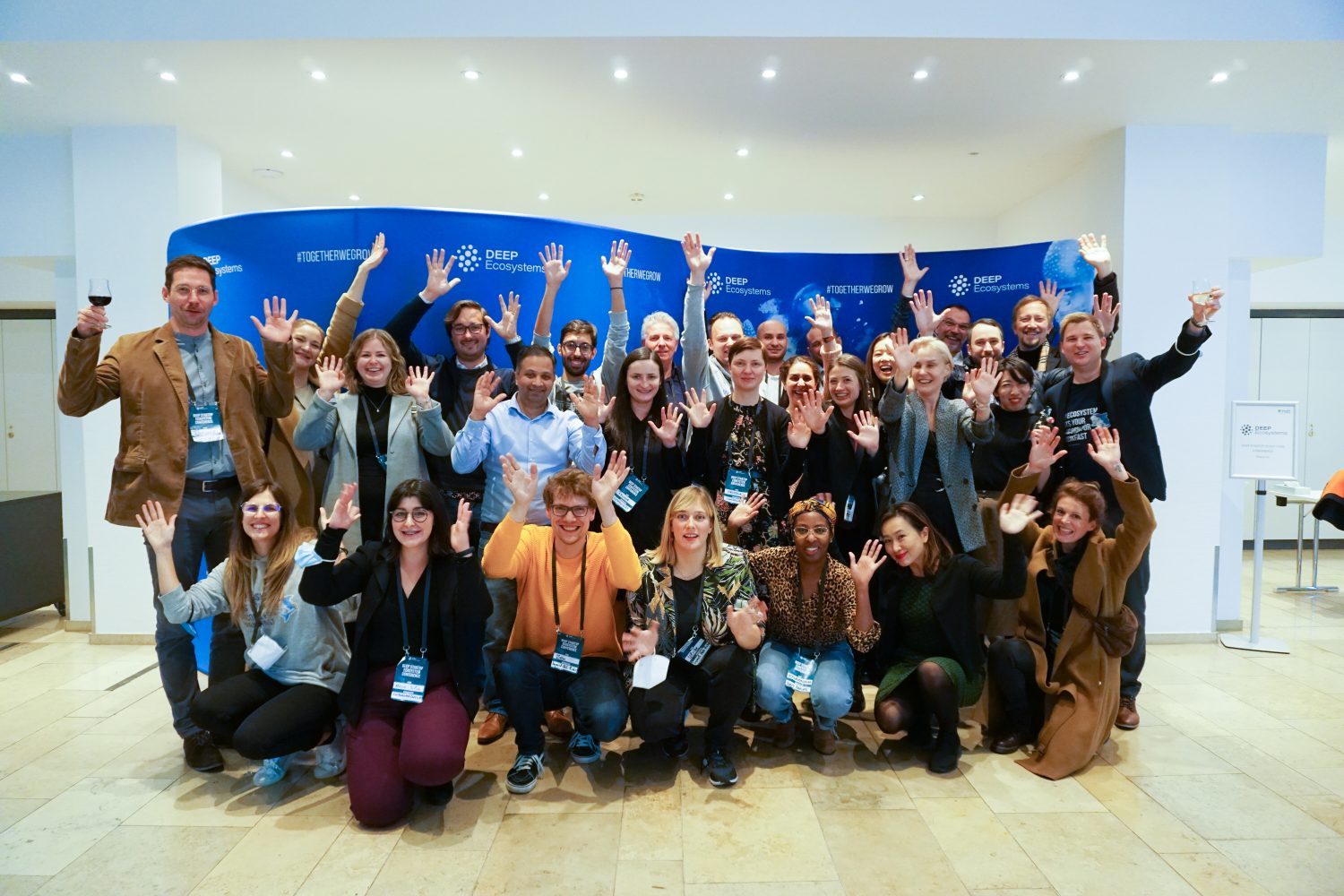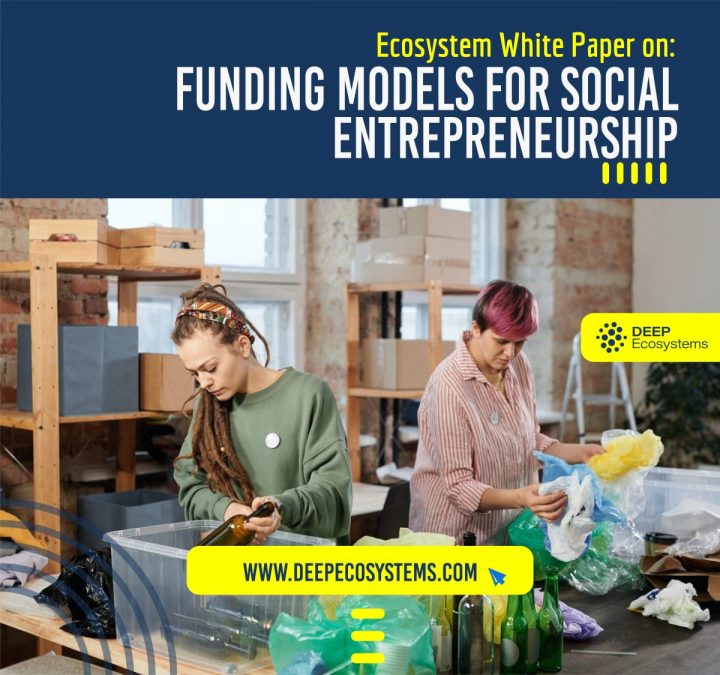The 2nd edition of the DEEP Startup Ecosystem Conference that took place in Essen, Germany on 18th October 2021 convened ecosystem leaders, entrepreneurs, policy makers and investors from across Europe and beyond. Their common goal is to foster discussion on the most pressing challenges that startup ecosystems face today. The event hosted a virtual think tank for a deep analysis of new funding models for impact startups.
Social Entrepreneurship has an inherent difficulty to find external funding. And this is mainly due to the following reasons:
- Reduced focus on profitability and therefore return of investment.
- Little incentives for financial investors to consider alternative returns.
- In case investors consider alternative returns, there is a remaining difficulty to quantify impact.
- Lack of growth mindset among impact founders, who like to act locally, rather than to build “impact unicorns”.
- Lack of business skills among social entrepreneurs who tend to focus almost exclusively on impact, rather than building a solid business model that can ensure the growth of their companies.
Based on the maturity of the social enterprise, impact businesses can seek funding from a variety of financial products that should be designed to their needs. Nevertheless, all data indicates that we need need to make improvements, so that the demand for social finance can be fully met by the supply.
1. Grants
The EU makes available different grant programs, especially as seed / pre-seed financing for social impact startups (both NGOs/ and for-profit social enterprises). Most EU granting opportunities are very competitive and only a few entrepreneurs get funded. At the same time, small social enterprises are generally unable to cope with complex administrative procedures. However, these are usually the norm in grants implementation. This is according to a study published by the European Commission. Examples:
- EU Programme for Employment and Social Innovation (EaSI): Social enterprises access investments of up to EUR 500,000 via public and private investors at national and regional level. For the period 2021- 2027 the EaSI programme will become a strand under the European Social Fund Plus (ESF+). And it has an allocated budget of almost € 99.3 billion.
- Some member states have designed programs supporting social innovation and social entrepreneurs through national ESF allocations for the 2014-2020 financial period (e.g. Portugal). And they are currently planning new specific priorities under the 2021-2027 ESF+ financial period
- Social enterprises receive support through pilot equity investments under the European Fund for Strategic Investments (EFSI) Equity instrument. Namely this works via funds linked to incubators or accelerators and co-investments with social Business Angels. Grants are also made available through CSR programs of large corporations for specific projects of social impact enterprises. But the timeline for launching such calls is unpredictable.
2. Crowdfunding
Individuals and companies from a community fund a specific cause to reach a defined target amount of money in a limited period of time. There are four types of crowdfunding:
- Donation-based crowdfunding is usually for NGOs. A campaign initiator gathers donations from a large pool of people. Example of platform for social entrepreneurs operating in Europe: GOTEO
- Rewards-based crowdfunding: for social enterprises that offer a product / service on the market. Individuals/companies contribute to a campaign in order to receive a reward (a product/service that the entrepreneur sells in advance). Example of platform for social entrepreneurs operating in Europe: consolid8
- Lending-based crowdfunding: The crowd lends money to a social enterprise with the understanding that the money will be repaid with interest. Examples of platforms for social entrepreneurs operating in Europe: Lumo, inno-investment
- Equity-based crowdfunding: The crowd invests in a social enterprise in exchange for shares in that specific social enterprise. Example of platform for social entrepreneurs operating in Europe: Bolsa Social.
A current trend that should be further developed is match-funding – combining grants with crowdfunding instruments. The European Crowdfunding Network has shown that match-funding practices have increased in the European Union over the past three years. And the flexibility of crowdfunding models and platforms has allowed for new partnerships with public administrations in a range of different organizational, political, social, and economic contexts.
3. Impact investing
As mentioned above, investors seek more and more to invest in impact businesses. The Global Impact Investing Network mentions that “while some investors have been making impact investments for decades, recently, there has emerged a new collaborative international effort to accelerate the development of a high- functioning market that supports impact investing. While this market is still relatively new, investors are optimistic overall about its development and expect increased scale and efficiency in the future”. Examples:
- Bethnal Green Ventures, a London-based VC. The company was founded in 2012, and focuses on impact tech. It clearly stands by gender equality, with 52% of female founders in their portfolio.
- Norrsken VC, based in Stockholm. The company was co-founded by Niklas Adalberth, one of the creators of Klarna.
- FASE has the vision to create a thriving ecosystem for social innovation by boosting impact finance across Europe. Their vision was supported by the EU through different support mechanisms
- Tilia Impact Ventures is the first impact fund in the Czech Republic investing in social enterprises.
- Demeter probably the largest impact investor in Europe. And it is a major player in venture capital and private equity for the ecological transition.
4. Microfinance
Microcredit & microloans offered by non-banking financial institutions to social enterprises backed by the European Union, through the Employment, Social Affairs & Inclusion (EaSI) programme.
5. Ethical Banks
Here the idea is target more mature social enterprises. They can show traction and assets, or are local banks that have a better understanding of the needs of social entrepreneurs and their business models. And usually their products are backed by guarantees under the EaSI programme. Examples:
- FEBEA network (European Federation of Ethical and and Alternative Banks and Financiers) – it gathers 33 financial institutions from 15 countries in Europe, with the aim of developing and promoting ethical finance principles.
- Aspiration – does not invest in fossil fuels, weapons and the bank donates 10% of every dollar that its customers spend to charity.
- Amalgamated Bank – is a New York-based bank that focuses on strengthening communities through renewable energy efforts and affordable housing initiatives.
- Sunrise Banks focuses on driving social projects that improve the lives of community members across the country.
- Commercial banks that offer services for social entrepreneurs (example: Erste Bank).
6. Quasi-equity debt
A quasi-equity debt security is particularly useful for enterprises that are legally structured as nonprofits and therefore cannot obtain equity capital. Such a security is technically a form of debt, but it has an important characteristic of an equity investment: Its returns are indexed to the organization’s financial performance. Examples:
- Bridges Social Entrepreneurs Fund loaned £1 million to HCT – a company which uses surpluses from its commercial London buses, school buses, and Park & Ride services to provide community transportation for people who are unable to use the conventional public transport.
- Quasi Equity Debt feature: The fund takes a percentage of the revenues and shares some of the risks and gains of the business. And by tying up the loan to the revenue line, HCT has a strong incentive to manage the business efficiently. Usually, covenants on such loans are added to avoid the mission drifting away from social goals.
7. Pooling
The pooling model has spread globally with innovators such as IFMR Trust in Chennai. Here, actors are engaged in the securitization and structured finance of micro-finance loan portfolios in which they retain an investment share. Example:
- InsuResilience Investment Fund (IIF) by BlueOrchard lends to local micro-finance aggregators who give out micro and meso insurance products against extreme weather events and natural disasters. And the value of IIF investments is further enhanced by designated technical and premium support funding.
8. Cooperative Model (co-op)
A new strategy in fundraising is a business owned by its workers, users, or a combination of both. This makes its decisions democratically and allows shared investments. The concept comes from the agricultural cooperative, where farmers united to create shared resources or sales channels. Examples:
- CoTech is an association of creative technology cooperatives: Each member of the network is a company that is owned and democratically run by it’s workers (and, in some cases, customers). There are no private shareholders who take money out of the company and/or direct the company’s activities.
- Energy cooperative Cooperativa de Energie: the first renewable energy cooperative of Romania raised more than 300.000 € among its members in the form of a loan in order to buy a clean energy supplier.

Join us in Ludwigsburg!
The next conference will be on 23rd and 24th June in Ludwigsburg, Germany. The Stuttgart metropolitan area is famous for its hidden champions and high-tech innovators from Bosch to Porsche and MANN+HUMMEL. And Ludwigsburg itself is home to Europe’s best Film and Animation Academies.
The conference will feature international visionary keynotes, data-driven workshops on startup ecosystem trends, open networking sessions to engage with the startup’s scene thought leaders, governments, investors, corporates and innovation managers as well as a startup portfolio exchange for initiating long-term collaborations.
You can also find about the strategic recommendations from previous editions and read the following Strategy White Papers:
About DEEP Ecosystems
DEEP Ecosystems is a global community of startup ecosystem builders, dedicated to supporting grassroot innovation projects and fostering interconnectivity among startup ecosystems globally.
We believe in entrepreneurs to build ecosystems that solve the biggest challenges of our times. We help to grow and connect ecosystems through our DEEP Startup Ecosystem Accelerator (DEEPSEA), with over 200 alumni since 2018, one of the biggest ecosystem builder communities in the world that gathers twice a year in our DEEP Startup Ecosystem Conference. Both are backed by our data-driven insights and reports on startup ecosystems through our open Startup Heatmap Europe data platform.
